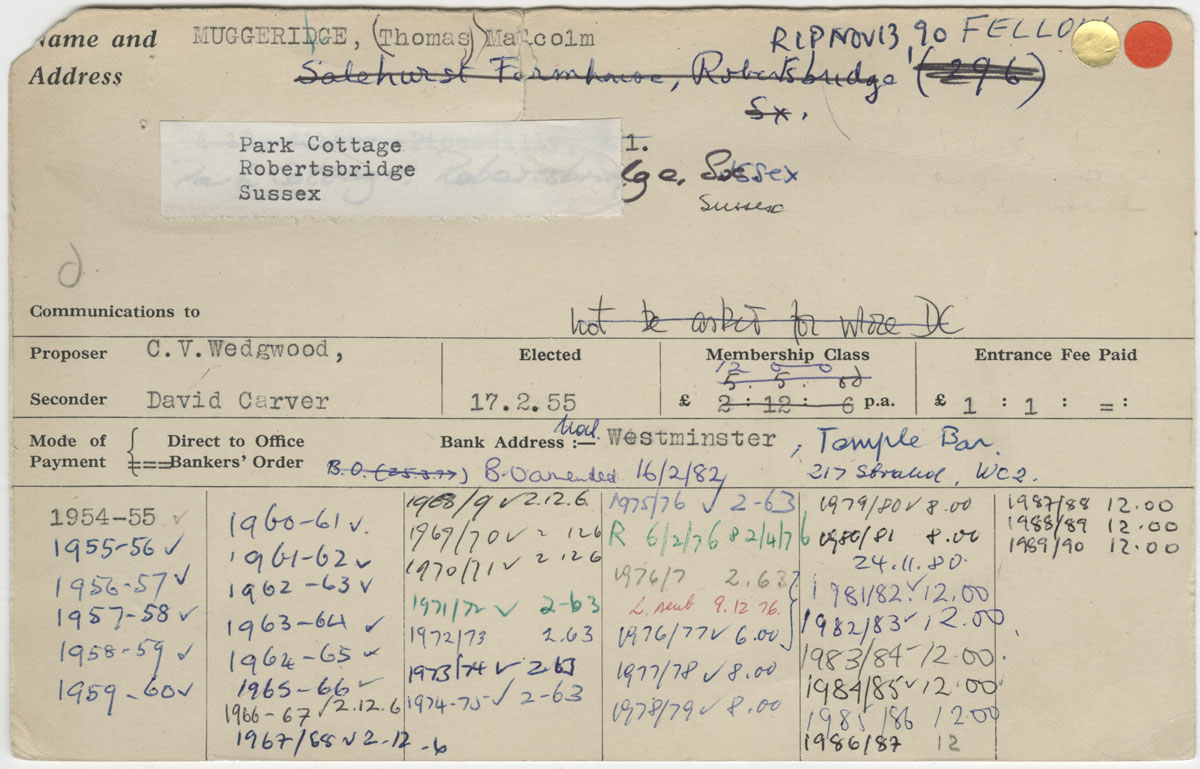The PEN records occupy 180 linear feet, span 1912 to 2008, and document the history and activities of the English PEN and PEN International, as well as the formation (and sometimes dissolution) of other PEN centers around the globe.
The records of PEN International and the founding center, English PEN, are closely interrelated; PEN International did not completely separate from its English predecessor until the late 1970s. The diversity of materials in the PEN records illuminates the range of activities in which the organization has engaged, from meetings and social gatherings to organized protests and campaigns to publications and literary awards. The archive is particularly rich in correspondence and administrative records as well as rare photographs, press clippings, and ephemera.
The collection contains more than 100,000 letters exchanged between officers, members, and individual centers, documenting major issues and priorities for the organization as well as the challenges of carrying forward day-to-day operations. The archive contains lengthy runs of correspondence by PEN founder, Catharine Amy Dawson Scott, and former PEN presidents and general secretaries including John Galsworthy, Hermon Ould, Storm Jameson, David Carver, and Arthur Miller. The PEN records also preserve a global correspondence from writers including Chinua Achebe, Elizabeth Bowen, John Dos Passos, T. S. Eliot, Havelock Ellis, Robert Frost, Nadine Gordimer, Günter Grass, Radclyffe Hall, Václav Havel, Aldous Huxley, James Joyce, Rudyard Kipling, D. H. Lawrence, Sinclair Lewis, Lin Yutang, George Orwell, Alan Paton, Octavio Paz, George Bernard Shaw, John Steinbeck, Aung San Suu Kyi, Dylan Thomas, H. G. Wells, Rebecca West, Thornton Wilder, Virginia Woolf, and W. B. Yeats.
One of the strengths of the collection is its documentation of political, social, cultural, and financial struggles providing context for the writing and reception of twentieth century literary works. The collection enables study of topics such as the impact of communism on literature, the influence of literature on the dialogue surrounding human rights, and the literatures of exile and diaspora.


PEN as a literary organization has endeavored to support and advocate for writers and literature for nearly a century. Membership drive correspondence shows how established members worked to maintain PEN’s size and funding base and to support the place of younger or lesser-known writers in the literary community. Documentation related to the 1927 congress in Brussels reveals PEN’s focus on promoting and facilitating translation of literary works to ensure “the flow of literary expression across language frontiers.” PEN’s advocacy for persecuted and under-represented communities and its role in supporting many minority cultures is well documented, as is the 1967 revelation that the Congress for Cultural Freedom, which provided financial support for PEN International, was funded by the CIA.

The PEN records offer an unparalleled resource for study of human rights, politics, literature, and cultural history. They reveal the centrality of the humanities and humanists to our understanding of these fields. As philosopher and former president of the PEN America Kwame Anthony Appiah observed, “in these records you can review a cross-national conversation… a model of the cosmopolitan dialogues that are one of the most exemplary of the impulses of the humanities.” The records also reveal the role PEN has played in preserving the world’s cultural heritage during the twentieth century, a role it assumed in 1926, when PEN President John Galsworthy introduced a resolution stating: “In all circumstances, and particularly in time of war, works of art, the patrimony of humanity at large, should be left untouched by national or political passion.” The PEN records not only document the effort to preserve cultural heritage materials, but are themselves a repository of materials no longer surviving elsewhere due to the demise of some PEN centers, political interference, or wartime destruction.
The research value of the PEN records is enhanced by the presence of related collections at the Ransom Center. The Center’s collects materials that complement existing holdings and deepen resources available for research. Numerous collections at the Center document authors who were PEN officers or active members, among them Sybille Bedford, Christine Brooke-Rose, Joseph Conrad, Nancy Cunard, John Galsworthy, Nadine Gordimer, Storm Jameson, Francis Henry King, D. H. Lawrence, Norman Mailer, W. Somerset Maugham, Arthur Miller, J. B. Priestley, Elmer Rice, George Bernard Shaw, Tom Stoppard, Paul Valéry, and H. G. Wells.
Collections that support research into human rights and censorship issues include papers of Maurice Cranston, Morris Ernst, Erle Stanley Gardner (Court of Last Resort materials), Fannie Hurst, Michael Josselson (Congress for Cultural Freedom materials), Jessica Mitford, Nicolas Nabokov, Oliver La Farge, and the Transcription Centre.
